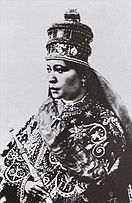The 1928 Ethiopian coup d'état attempt was orchestrated by supporters of Empress[nb 1] Zewditu to rid her of the heir apparent and Crown Prince, Ras[nb 2] Tafari Makonnen.[nb 3] With Tafari gone, Zewditu would be the sole ruler of the Ethiopian Empire (Mangista Ityop'p'ya).
| 1928 Ethiopian coup d'état attempt | |
|---|---|
| Part of Gugsa Wale's rebellion | |
Ras Tafari (Haile Selassie) (left) and Empress Zewditu (right), the two leaders of the coup attempt | |
| Date | September 1928 |
| Location | |
| Goals |
|
| Methods | Encirclement |
| Resulted in |
|
| Lead figures | |
Crown Prince Ras Tafari | |
Events
editIn September 1928, in Addis Ababa, a group of palace reactionaries made a final bid to rid the Empress of Tafari. The group included some of Zewditu's courtiers. The attempted coup d'état was tragic in its origins and comic in its end.
When confronted by Tafari and a company of troops, the ringleaders of the coup took refuge on the palace grounds in Menelik's mausoleum. Tafari and his men surrounded them only to be surrounded themselves by the personal guard of Zewditu. More of Tafari's khaki clad soldiers arrived and surrounded Zewditu's guard. Tafari's soldiers were equipped with newly imported rifles, machine guns, small cannon, and an obsolete but menacing tank.[1] The tank, a Fiat 3000, had been a gift to Empress Zewditu from the Duke of Abruzzi of Italy during a visit some years earlier.[2][nb 5]
In the end, the superiority of arms of the forces supporting Tafari decided the outcome in his favor.[3]
See also
editNotes
edit- Footnotes
- ^ Negesta Nagastat, roughly equivalent to Queen of Kings or Empress regnant.
- ^ Roughly equivalent to Duke.
- ^ Inderase, equivalent to Regent.
- ^ In 1928, the crypts of Menelik (center), and Taytu Betul (left) would have been in place. Zewditu's crypt (right) was added later.
- ^ According to Time Magazine, Menen Asfaw herself commandeered the tank and came to the aid of her husband.
- Citations
- ^ Marcus, pp. 127–128
- ^ Time Magazine, Smooth Show
- ^ Marcus, p. 128
References
edit- Haile Selassie I, Translated and Annotated by Edward Ullendorff (1999). My Life and Ethiopia's Progress: The Autobiography of Emperor Haile Selassie I, King of Kings and Lord of Lords, Volume I: 1892-1937. Chicago: Research Associates School Times Publications. p. 338. ISBN 0-948390-40-9.
- Haile Selassie I, Edited by Harold G. Marcus with others and Translated by Ezekiel Gebions with others (1999). My Life and Ethiopia's Progress: The Autobiography of Emperor Haile Selassie I, King of Kings and Lord of Lords, Volume II. Chicago: Research Associates School Times Publications. p. 190. ISBN 0-948390-40-9.
{{cite book}}:|first=has generic name (help) - Marcus, Harold G. (1994). A History of Ethiopia. London: University of California Press. pp. 316. ISBN 0-520-22479-5.
External links
edit- "Smooth Show". Time Magazine. January 21, 1935. Archived from the original on November 4, 2012. Retrieved January 1, 2010.

